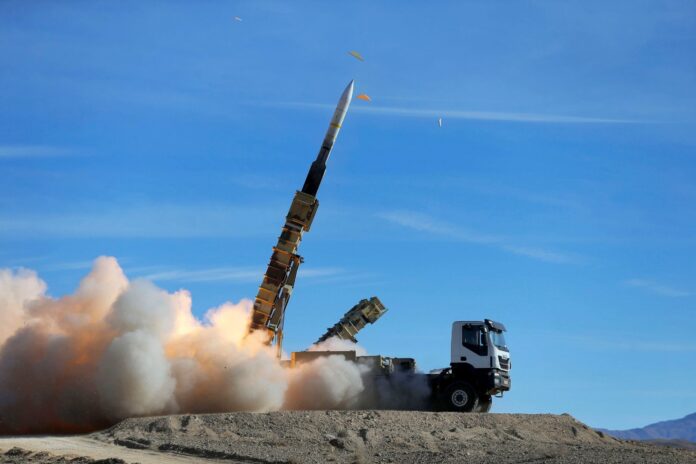In a dramatic escalation of tensions, Iran launched a barrage of ballistic missiles targeting Israel on Tuesday, responding to Israel’s military campaign against Tehran’s Hezbollah allies in Lebanon. Alarms echoed across Israeli cities, including Jerusalem and the Jordan River Valley, sending citizens rushing into bomb shelters as explosions reverberated throughout the region. In a scene of heightened intensity, reporters on live broadcasts were seen lying flat on the ground amid the attacks.
According to Israeli army radio, nearly 200 missiles were fired from Iran, marking a significant uptick in hostilities. Iran’s Revolutionary Guards confirmed the attack, stating that “tens of missiles” had been launched and warning of a “more crushing and ruinous” response should Israel retaliate.
Israel’s military soon lifted the alert, allowing citizens to leave shelters, with no immediate reports of casualties. Military spokesman Daniel Hagari called the missile strikes a grave act, hinting at severe repercussions.
A senior Iranian official disclosed to Reuters that the missile strike order came directly from Supreme Leader Ayatollah Ali Khamenei, who remains in a secure location as tensions escalate.
Oil Prices Surge Amid Fears of Wider Conflict
The missile strikes sent shockwaves through global markets, with oil prices spiking by five percent. This attack heightens the threat of a broader conflict between two arch-enemies, Iran and Israel. While a similar round of missile fire in April had been intercepted with assistance from the U.S. and other allies, this latest salvo raises concerns about a deeper, more dangerous confrontation.
Lebanese Front Heats Up: Ground Raids and Hezbollah’s Losses
The situation in Lebanon has also escalated rapidly, with Iran promising retribution after Israeli strikes claimed the lives of top Hezbollah leaders, including its prominent figure, Hassan Nasrallah. Israel, for its part, confirmed ground raids into Lebanon, though it described these operations as limited.
In Washington, President Joe Biden assured U.S. support for Israel, stating, “We are prepared to defend Israel against these attacks and protect American personnel in the region.” The U.S. has signaled its readiness to assist as tensions simmer across the Middle East.
The U.N. Calls for Ceasefire Amid Growing Regional Conflict
United Nations Secretary-General Antonio Guterres condemned the escalating violence, urging an immediate halt to hostilities: “This must stop. We absolutely need a ceasefire.” The U.N. has been monitoring the situation closely as Israel and Hezbollah appear on the brink of a broader conflict.
Lebanese Resistance and Mounting Casualties
In Lebanon, more than a thousand people have been killed, and over a million displaced following relentless Israeli airstrikes. In a further blow to Hezbollah, Israel announced the killing of senior commander Muhammad Jaafar Qasir, responsible for overseeing weapons transfers from Iran.
Amid mourning in the city of Sidon, the aftermath of the strikes was palpable. Abdulhamid Ramadan, a local resident, spoke of the devastation: “I lost my daughter and wife. My home is gone. My whole life changed in a second.” His words echoed the widespread grief and anger felt across the region.
A Call to Arms: All of Lebanon United Against Israel
Many Lebanese citizens have expressed their determination to resist Israel’s advances. “Not just Hezbollah, all of Lebanon will fight this time,” said Sidon resident Abu Alaa, vowing retaliation for the devastation in Gaza and Lebanon.
In Beirut, Israeli airstrikes targeted high-rise buildings in both the central Jnah area and the southern suburbs, briefly shutting down access to the city’s airport. The Israeli military described the strikes as “precise,” aimed at securing its northern border and preventing further Hezbollah attacks.
A History of Conflict with Lebanon
Israel’s conflict with Lebanon has a long and bloody history, stretching back to its 1982 invasion during Lebanon’s civil war. Though Israel withdrew in 2000, it returned to wage a full-scale war against Hezbollah in 2006. Since then, a tense peace along the U.N.-monitored border has persisted, with sporadic flare-ups like the one unfolding now.
With Hezbollah entrenched as Lebanon’s most powerful military force, backed by an arsenal of Iranian-supplied rockets, the risk of a large-scale war looms large. As Israel calls up additional reserve brigades for operations along its northern border, the possibility of further escalation appears increasingly likely.
Amid the rising tensions, all eyes remain on the region, where a precarious balance between retaliation and restraint may determine the future of this fragile peace.

